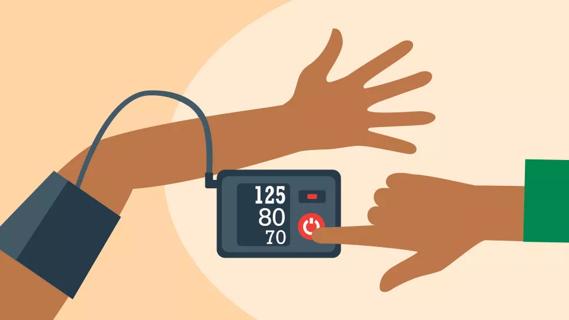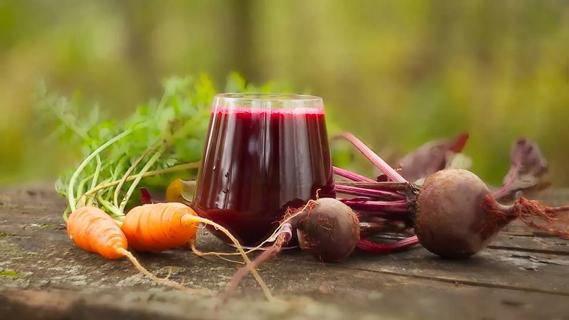Foods high in potassium, calcium and vitamins C and E can help lower your blood pressure
Keeping your blood pressure in check is important for your health. If it’s too high, your blood pressure can lead to serious conditions like stroke or heart disease.
Advertisement
Cleveland Clinic is a non-profit academic medical center. Advertising on our site helps support our mission. We do not endorse non-Cleveland Clinic products or services. Policy
While medications like beta-blockers can help lower your blood pressure, did you know that you can also eat certain foods to help lower blood pressure?
Registered dietitian Julia Zumpano, RD, LD, shares how certain foods can help lower your blood pressure.
Antioxidant-rich foods may have a small impact on blood pressure levels. Foods high in vitamin C, vitamin E, potassium, selenium or L-arginine are good options if you’re looking to lower your blood pressure. Antioxidants protect your cells from damage and can reduce inflammation, which, in turn, can keep blood pressure managed.
Here’s how these types of foods can help:

Image content: This image is available to view online.
View image online (https://assets.clevelandclinic.org/transform/cf986ff5-16ce-4b5b-bdb2-d9b43b822c08/lowering-blood-pressure-foods-infographic)
Eating certain foods can be a natural way to lower blood pressure. If you’re currently on a beta-blocker medication, you should talk to your doctor first.
Advertisement
“Getting the benefits naturally from foods is the best option,” says Zumpano. “Eating foods rich in antioxidants and nutrient-dense foods can improve your overall heart health.”
Foods that help lower blood pressure include:
While citrus fruits are known to help lower blood pressure levels, research shows that eating any kind of fruit can help. Try eating more:
“Fruits can provide vitamin C, vitamin E, potassium, magnesium and fiber all of which have been shown to improve blood pressure and overall heart health,” shares Zumpano.
You can also get a good dose of vitamin C from certain vegetables, while others boast a decent amount of potassium. Focus on eating:
“Vegetables are foundational when it comes to controlling blood pressure, and diets such as the Dietary Approach to Stop Hypertension (DASH) and Mediterranean diet have proven their effectiveness,” says Zumpano. “In addition to the vitamin C and potassium, this star food group packs a nutritional punch providing magnesium, nitrates, calcium, antioxidants and fiber.”
Lean meat can be a good option thanks to the selenium and L-arginine found in most types. Examples include:
“Lean meats have been shown to keep your heart healthy by providing protein, which helps support lean muscle mass, weight and blood sugar management,” says Zumpano.
Fatty fish are known for being high in omega-3 fatty acids. Research shows the fat may help lower your blood pressure — and may improve your overall heart health. Choose from:
“Omega-3 fatty acids have been proven to reduce inflammation and promote blood vessel dilation,” says Zumpano.
Research shows that eating whole grains can reduce high blood pressure. Consider eating more:
“Whole grains are packed in fiber, antioxidants, magnesium and potassium, which all help keep blood pressure in check,” outlines Zumpano.
Adding legumes to your meals can help you get enough potassium each day. Try:
“Legumes are a staple of the Mediterranean diet and whole food plant-based eating plans, which have both shown to support heart health due to the fiber and antioxidants they provide,” notes Zumpano.
Advertisement
Sure, dairy can be a good source of calcium. But you can also benefit from potassium found in certain dairy products. For example, research shows that eating yogurt each day can improve your blood pressure. You might be surprised how much potassium you get from:
“Calcium helps blood vessels constrict and relax,” explains Zumpano. “Calcium-rich foods are recommended daily on the DASH diet, which has been proven to create optimum blood pressure values.”
Incorporating nuts and seeds into your meals can help reduce blood pressure. Many varieties have either vitamin E or potassium. Some nuts and seeds may also have L-arginine. Try eating:
“The fiber, healthy fats and plant protein found in nuts and seeds keep inflammation at a minimum, blood sugars in check and your body trim,” says Zumpano.
The antioxidants and fat-soluble vitamins found in plant-based oils may help lower your blood pressure. Try:
“Healthy oils add flavor to foods without needing added salt, dressings or marinades, which can aid in a reduction in overall salt (sodium) intake, leading to improved blood pressure values,” notes Zumpano.
Advertisement
Getting nutrients from whole foods is best to help lower your blood pressure.
So, while you may be tempted to take supplements like omega-3 fatty acids, CoQ10 and magnesium to help with your blood pressure, think twice. Supplements can be risky, based on the type of supplement and the concentration taken, and they may also interfere with certain medications.
While including certain foods in your diet can aid in blood pressure reduction, your lifestyle choices can help, too.
“It’s very important to note exercise, stress reduction, a low-salt diet and maintaining a weight that’s healthy for you can also positively influence blood pressure,” says Zumpano.
Advertisement
Learn more about our editorial process.
Advertisement

Making lifestyle changes can help reduce your blood pressure, but taking cinnamon supplements probably isn’t one of them

Hypertension strains your heart and blood vessels, causing damage that can contribute to heart attacks

Elevate your BP by lying down, drinking water or cooling off

Daily stressors can increase BP in the moment, as well as contribute to habits that can feed long-term hypertension

Moderation is best when consuming caffeinated drinks to avoid unhealthy spikes in BP

Medication, exercise and diet changes can all help

An ideal blood pressure is less than 120 mm Hg systolic and less than 80 mm Hg diastolic

While not magic elixirs, some drinks like beet juice and skim milk may help keep numbers down

Wearing a scarf, adjusting your outdoor activities and following your asthma treatment plan can help limit breathing problems

Your diet in the weeks, days and hours ahead of your race can power you to the finish line

When someone guilt trips you, they’re using emotionally manipulative behavior to try to get you to act a certain way